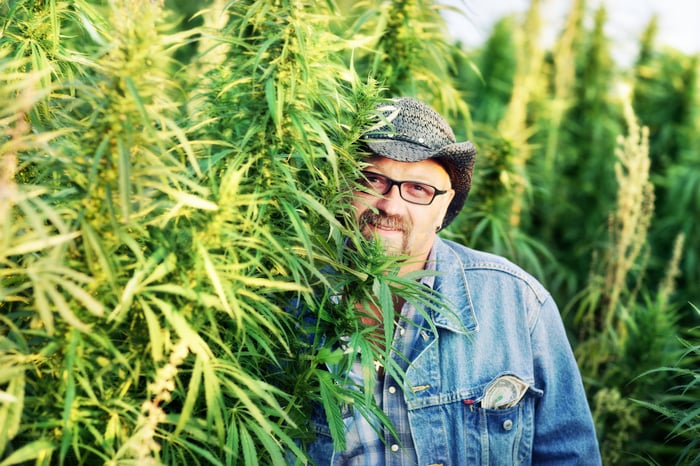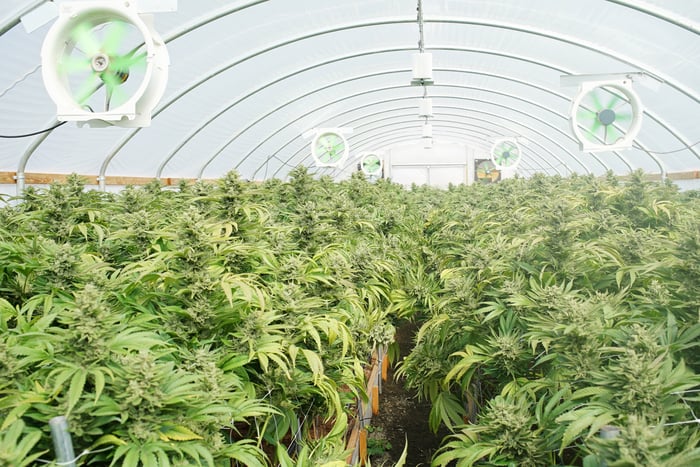Sure, cryptocurrencies have had investors seeing green over the past year, but arguably no tangible industry has been growing faster, and with more consistency, than the legal marijuana industry.
According to ArcView, one of the leading cannabis research firms, the North American legal weed market is expected to grow by a compound annual rate of 26% through 2021. Should this estimate prove accurate, we could be talking about nearly $22 billion in annual sales, up from less than $7 billion in 2016. That's a big reason investors have flocked to marijuana stocks and pushed their valuations into the stratosphere.

Image source: Getty Images.
Aside from these sales figures, investors have also piled into marijuana stocks as a result of a shift in the public's opinion toward pot. In the U.S., four separate polls conducted since April demonstrate in an overwhelming fashion that respondents want to see both recreational and medicinal cannabis legal. This change in opinion is what allowed Mexico to legalize medical weed as of June 2017, and it's the catalyst pushing forward legislation in Canada that could have adult-use marijuana legal by July. Should Canada move forward with recreational legalization, it would become the first developed country in the world to do so.
Canadian growers are seeing green
Though the U.S. could easily be the most profitable cannabis market in the world, U.S. politics simply aren't favorable to weed companies at the moment. Marijuana remains a Schedule I drug at the federal level (meaning it's entirely illegal, is considered to have a high potential for abuse, and has no recognized medical benefits), and Attorney General Jeff Sessions has effectively waged war on the industry. Instead, it's Canada that looks to lead the way for the legal pot industry. Not surprisingly, it's also where we find the marijuana stocks capable of producing the most legal cannabis.
Assuming they're able to stay on budget and plan, these four marijuana stocks should yield a minimum of 100,000 kilograms (kg) of cannabis annually by 2019.

Image source: Getty Images.
Aphria: Around 220,000 kgs
First up is Aphria (NASDAQOTH: APHQF), which should be capable of roughly 220,000 kg of dried cannabis production once its primary expansion project is complete in January 2019, and a newly announced partnership is fully ramped up.
The company's more than $100 million fully funded project aims to expand the its growing capacity in four phases to 1 million square feet. It's also possible Aphria produces more than 100,000 kg annually out of this project, as it's upped its production yield multiple times over the past year.
Meanwhile, a recently announced partnership with Double Diamond Farms will add 120,000 kg of growing capacity by 2019, saving Aphria a full year from having to build out its own 100-acre site.
What's unique about Aphria is that it's trying to expand organically, rather than relying too much on acquisitions to do the heavy lifting. It's a bit of a slower process this way, but it's also allowed the company to better control its costs and remain profitable. In fact, Aphria is one of two marijuana stocks to have reported a full-year profit in each of the past two years.
Aphria also finds itself among a very small group of growers with a green light to export dried cannabis to foreign countries that've legalized cannabis (mainly European countries). For instance, Germany recently legalized medical pot, but it has a nascent grow industry. It's supplementing that for the time being by importing dried cannabis from Aphria and other Canadian growers. Combine this ability to export with a mammoth medical marijuana online supply deal with the 1,300-store Shoppers Drug Mart chain in Canada, and Aphria's prospects look appealing.

Image source: Getty Images.
Aurora Cannabis: Around 130,000 kg
Perhaps no marijuana stocks has been more gung-ho with its expansion than Aurora Cannabis (ACB -1.15%). Despite operating only a 50,000-square-foot facility at the moment, the company's crown jewel, known as Aurora Sky, is set for completion in mid-2018, which would be right in time for Canadian legalization. This 800,000-square-foot facility is expected to be highly automated and to significantly lower growing costs while yielding over 100,000 kg of dried cannabis annually. When added to its 40,000-square-foot Aurora Vie project in Quebec, the company should handily top 100,000 kg of annual production.
However, Aurora also announced the acquisition of Saskatchewan-based CanniMed Therapeutics (NASDAQOTH: CMMDF) for $1 billion in a cash-and-stock deal this past week. After making an unsolicited bid for the company and being rebuffed, Aurora eventually sweetened the deal and gained the support of CanniMed's board of directors. The combined company is capable of pushing Aurora Cannabis to around 130,000 kg of annual production and could also lower its costs even further in the process.
One note of caution, though: No marijuana stock is diluting its shareholders quicker than Aurora. Yes, it has the most cash on its balance sheet than any other cannabis company, but that's because of the multitude of bought-deal offerings it's undertaken. This is something prospective investors should keep in mind as this dilution could come back to haunt them in the years to come.

Image source: Getty Images.
Canopy Growth Corp.: Close to 200,000 kg
Unlike Aphria and Aurora Cannabis, which tend to be upfront about their annual yield, Canopy Growth Corp. (CGC 1.28%), a projected leader in recreational and medical cannabis market share, is far more tight-lipped. My suspicion, assuming the company remains on track with its construction and development, is it'll be capable of close to 200,000 kg of annual production by 2019.
Why so much? According to comments in the company's second-quarter earnings report, Canopy Growth was in the process of developing or constructing 2.4 million square feet of growing capacity in British Columbia, with the ability to lease an additional 1.7 million square feet in the region. Canopy has so many projects, it's unclear exactly which projects will be complete by mid-2018, when adult-use sales are expected to become legal, and which won't. However, one thing is pretty clear: Of the individual growers, few, if any, have the growth potential or square footage capacity of Canopy at the moment.
Also helping is that Canopy has the most recognized cannabis brand in the country in Tweed, and it's among that aforementioned group capable of exporting its dried cannabis to overseas medical cannabis-legal countries.

Image source: Getty Images.
Cannabis Wheaton Income Corp.: Around 230,000 kg
It's not a traditional grower that's primed to offer the most cannabis for sale in 2019. Cannabis royalty company Cannabis Wheaton Income Corp. (CBWTF -0.83%) expects about 230,000 kg of dried cannabis yield in 2019, which should be ahead of Canopy Growth and Aphria, assuming its contracted partners remain on schedule and Canada moves forward with recreational legalization this summer.
The royalty cannabis model might prove to be the smartest way to invest in legal pot. Though it requires hefty upfront expensing, which is a big reason its valuation is nowhere near that of the above three producers despite the expectation of 230,000 kg of annual yield, its margin should be significantly higher than those of its peers. Its cost of goods sold per gram is expected to be only around $2, whereas the average selling price per gram in Canada is north of $6.20. Not surprisingly, this royalty stock expects an average internal rate of return of 60% on its deals.
It's also worth noting that the royalty route allows investors access to multiple projects with a single stock. Cannabis Wheaton has contracts with around 15 different grow facilities located throughout Canada, which means an issue at one or two facilities doesn't mean game over for Cannabis Wheaton or its investors.
If you're looking to potentially own a piece of Canada's biggest marijuana players, these four names would be a good place to start your research.





